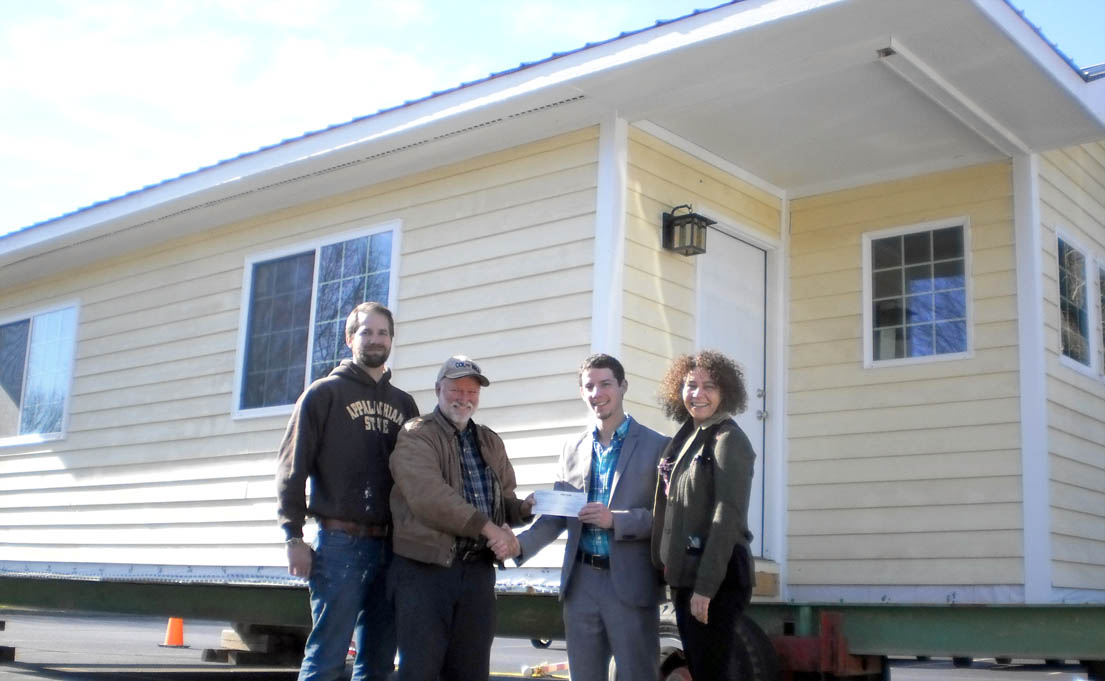
College News
CCCC's Sustainable Technologies program expands to the community
12.18.2014 • College & Community, College General
PITTSBORO - Central Carolina Community College has expanded the scope of its Sustainable Technologies program through real world learning applications like small house construction and community outreach initiatives that promote green building practices.
The college has auctioned off a second small house, Chatham Cottage, designed and built by CCCC students who followed environmentally friendly principles such as maximum energy efficiency and reduction of waste, pollution and negative environmental impact.
The small house student construction project was launched as an academic assignment in 2012 with the aim of eliminating the inefficiencies of typical suburban homes, while allowing people to still live on-grid. At the same time, the house is also designed to give buyers the option to live off-grid using a solar PV system. This house, built in 2013-2014, is the second small house constructed.
The winner of the first Affordable Small House Yearly Competition was announced in August. Co-sponsored by CCCC, Habitat for Humanity, the Small House Institute and the Abundance Foundation, the Affordable Small House Competition awards a cash prize to the student with the best small house design.
The goal of the contest is to highlight good design and research in relation to affordable, energy and resource efficient, aesthetically pleasing small house construction. Judges for the competition included Alicia Ravetto, AIA and LEED Fellow; Marshall Dunlap, LEED AP; and Harvey Harman, Construction Supervisor for Habitat for Humanity, Chatham.
In addition, CCCC announced earlier this year that it would build a small house in partnership with Chatham Habitat for Humanity and The Small House Institute. According to Harvey Harman, the goal of this small house project is to encourage the community to learn more about how small houses can be incorporated into future developments and to determine if Habitat could serve a larger portion of the population by making small houses an option for future Habitat owners. Harman said Habitat is exploring the efficacy of small houses to serve seniors, single adults, younger couples, disabled veterans and adults with disabilities. As part of the project, he instructed a continuing education course at CCCC on small house construction in which students, along with Chatham Habitat volunteers and other interested parties, actually began construction on a small house on Habitat property on West Street in Pittsboro.
"The small house movement is a national trend focusing on a smaller residential footprint to reduce energy and water use and use building resources wisely," said Laura Lauffer, Sustainability Coordinator and lead instructor of the Sustainability Technologies program at the Pittsboro Campus.
"We are excited about our participation in these small house projects -- Chatham Cottage, the Small House Design Contest and the continuing education class in collaboration with Habitat for Humanity to construct a small house. It is initiatives like these that raise awareness and begin conversations about environmental conservation throughout the community."
David Kendall, a student at the University of North Carolina at Greensboro, was the winner of the Affordable Small House Design Competition. Kendall, a senior interior architecture major from Greensboro, said he has been interested in architecture since the age of seven when he began making changes to floor plans that were featured in the Sunday newspaper.
Kendall's winning small house design is made of cordwood construction, which acts as a thermal mass, keeping the space warm at night. The front of the house faces south and has ample glazing for solar gain. The roof overhang also allows winter sun to enter the home, but blocks out the summer sun to prevent overheating. To allow the heat to escape, the windows in the roof can be opened. The main room of the house is also geared toward efficiency, containing a furniture system made of cubes that can be rearranged to create anything from bookshelves to an entertainment center to table and chairs.
"I do think small houses will be important for our future," Kendall said. "Building excessively large homes uses a great deal of energy as well as materials. Building smaller creates an opportunity to more efficiently utilize the resources that we do have and will hopefully contribute to a society that is focused on more than consumption."
CCCC offers dynamic classes in green construction, training for electrical and plumbing trades and renewable energy to prepare the local workforce in the rising demand for a clean, efficient energy economy. In addition, the CCCC Chatham County Campus is offering a Sustainable Living Institute this spring with evening classes on small house design and sustainable homesteading.
For more information on small homes and the Sustainable Technologies program at CCCC, contact Laura Lauffer at 919-545-8032 or e-mail her at llauffer@cccc.edu.

Central Carolina Community College has auctioned off a second small house, Chatham Cottage, designed and built by CCCC students who followed environmentally friendly principles such as maximum energy efficiency and reduction of waste, pollution and negative environmental impact. Pictured is Andrew McMahan, Sustainable Technology Department Chair; Harvey Harman, Construction Supervisor, Habitat for Humanity; David Kendall, who was the winner of the Affordable Small House Design Competition; and Laura Lauffer, CCCC Sustainability Coordinator.
- Central Carolina Community College
- Serving Chatham, Harnett, & Lee Counties, NC
- 1-800-682-8353

